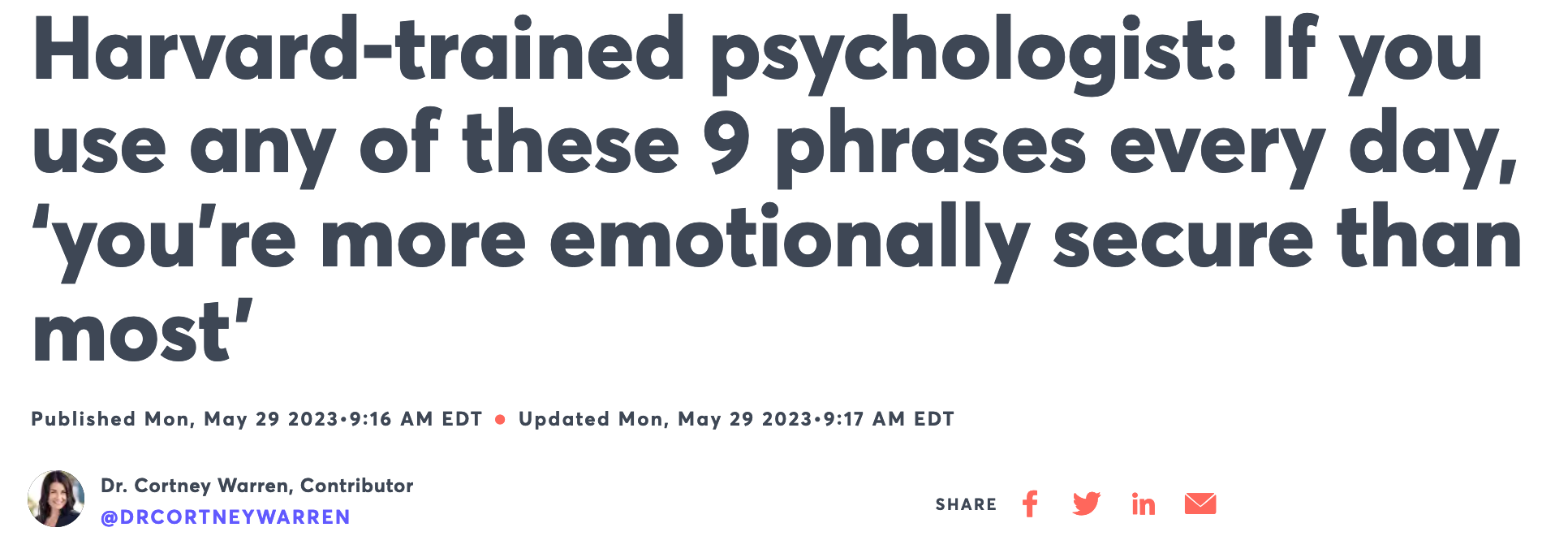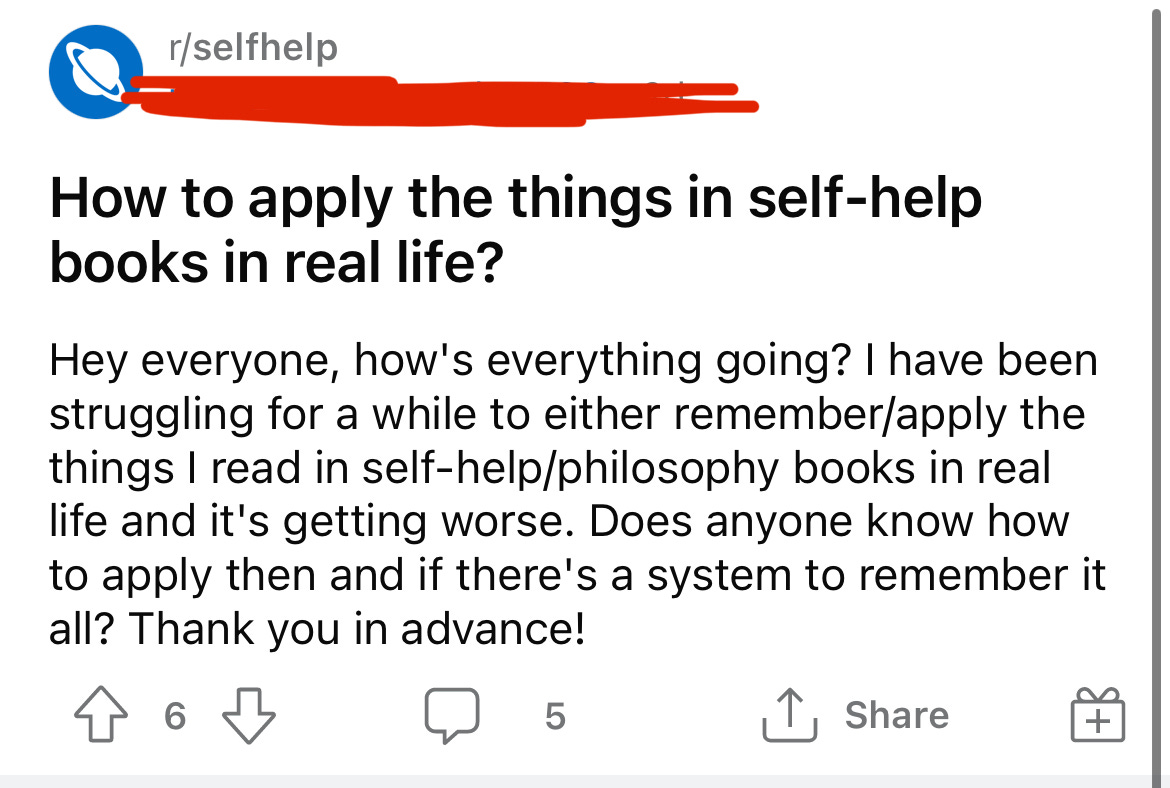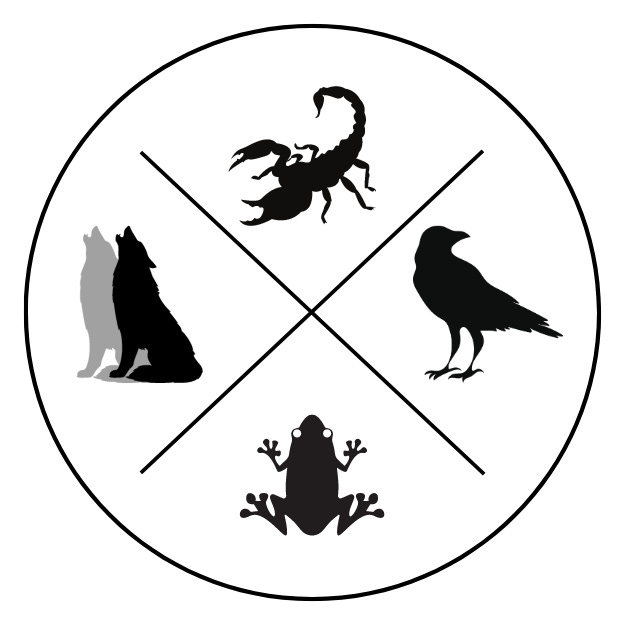The 7 most effective self-improvement subject lines
I will be so disappointed if the open rate for this article is higher than normal but I bet it will be
Gidday Cynics,
You’ll be pleased to know I have been extremely productive in nearly every facet of my life except writing this newsletter.
As far as writing goes, I’ve been busy. On top of a fairly intense day-job writing workload, I’ve smashed out quite a few thousand words for various outlets. I wrote an in-depth video game explainer aimed at non-gamer parents for the excellent Emily Writes. If you haven’t already read it, you might find it helpfully self-improvement-adjacent. Sample:
While video games are not bad for your brain, they are mentally taxing and time-consuming by design. They can foster compulsive behaviours that can look a lot like addiction in both children and adults. It’s very easy for kids — and me! — to stay up late playing games, get very little sleep, and be a wreck the next day. What’s more, kids (particularly neurodivergent kids) can find competitive games difficult, especially if they feel that another team or the game itself is being “unfair.” This can lead to meltdowns; in gamer-speak, it’s called “tilted.” Adults are not immune. My language (not on mic!) during nighttime Halo sessions could melt steel beams. It is something I am trying actively to fix, as it’s not a habit I want to pass on to my kids.
That piece prompted a few of Emily’s subscribers to come here. If that’s you, then welcome! I hope you enjoy whatever this is.
I also wrote a guest sermon piece for David Farrier’s Webworm which may or may not appear in the near-to-distant future. Sneak peak:1
Bible translations vary a lot, but there is no version of the story where the Samaritan puts the injured man in a chokehold and kills him.
Plenty of people have made this exact observation, not least the Reverend Al Sharpton, who delivered the eulogy at Jordan Neely’s funeral. But I’m interested in what it says about the many people on the right-wing of United States politics — including, perhaps, up to 25 percent of the population — who call themselves Christians.
I don’t think they’re Christians at all. I think they’re something else.
Something terrible.
Sinister! In lighter news, the cult of orthodox economics has long been the funniest “science,” and the economic establishment has just now outdone themselves by begging the public to stop taking their predictions in any way seriously. Yes, really. I wrote about this for my occasional media/politics blog, The Bad Newsletter:
Without a finely-honed economic sense of humour like mine you might have missed the joke. Let me explain while trying not to laugh too hard because I still can’t believe they said the quiet part quite so loud: because their predictions keep turning out to be wrong, economists are asking us to take a radically different view of the word “prediction.” Rather than assessing an economic prediction’s success using the conventional calibration — whether or not it happens — we are asked to reflect on whether the prediction tells us anything about the present.
Now that we’ve got all those accomplishments out of the way, let us get down to the more usual business of feeling shitty about our lack of self-improvement. I’ll start by asking: does anyone else do this thing?
Running away from tasks, literally
Imagine I’m beginning something new — hypothetically, let’s say “today’s Cynic’s Guide newsletter.” I’ll feel a charge of excitement, but instead of opening a document and writing something, I’ll spontaneously stand up and stride briskly away. This isn’t a conscious thing: I’ll often be a considerable distance from my desk before I realize what’s happened. Some mute bit of my subconscious hasn’t liked my sudden urge to get things done, has seized the controls, and steered me away.
This happens in other ways, that are less noticeable as physically running away from my work. The same process happens in miniature at my computer multiple times a day. In fact, it happened a few seconds ago, which is why I bring it up. I was stuck on a sentence and instead of puzzling it out I flicked my forefinger over my laptop’s touchpad and dug into my Gmail tab. Why? There was nothing conscious about it; I’d checked my email only a few minutes earlier (and how often I check it has no bearing at all on how often I reply to things.) A momentary lull in executive function and off I go. At its worst, this is like being a passenger in your own brain, seeing through the eye-holes of a dumb meat golem with the wrong set of instructions slipped into its skull, briskly traveling away from its work and up the stairs to do yet another line of the chocolate that’s meant to be for muffins.
I’ve been trying to think through why I might behave this way, and I’m approaching something plausible: I tend to work in all-or-nothing binge slogs. They start with frantic, productive clattering and ending with me slack-jawed, prodding dumbly at the keyboard trying to remember what words and letters are. This is exhausting and it’s probably what my helpful/unhelpful subconscious is trying to get me away from.

Now I’ve noticed this tendency, I’m pleased to have picked up a new self-help book that I might even finish reading. This one rejoices in the unwieldly title of How To Take Smart Notes: One Simple Technique To Boost Learning, Writing, and Thinking. It is by a bloke called Sönke Ahrens and is translated from German, which means its title is probably expressible in one lengthy word, perhaps something like Schmartnötenteknikallerninundwrittenschen. So far, it’s excellent, because it does something no other book I’ve ever read does: explains how to take notes in a way that works for my perpetually scattered attention. Here is one of my notes: you can decide how smart it is.

As it turns out, writing down every ridiculous thought circling around in my head — projects I might do, ideas I have, topics for articles, everything else — is incredibly freeing. It pins thoughts down and stops them taking up space. I’ve always struggled with systems, like project planners, that try to get you to write your ideas or todos down in a linear way: I’m finding it much easier to just write all the thoughts down and find the connections between them later. I like the idea of doing more tinkering, and less binge-writing.
I’ll write a piece on the book once I get through it. On that note, here are some scattered thoughts I’ve been able to shape into something sensical now I’ve yanked them out of the formless ether of my brain:
On schedules and routines
Those might be the two most boring words in the English language and they’re about to become a major part of my vocabulary. After last weeks’ even-more-obvious-than usual revelation that I will not become swole by writing about how I might one day become swole (in between bouts of video games) I am starting an exercise routine that involves picking up heavy things and putting them down again. I’m also returning to scheduled posts. I’m thinking Wednesday mornings NZ time, but if you have strong opinions on when you’d like to get this thing, let me know in the comments. Here’s what you can expect in the upcoming weeks:
- A thing on Smart Notes
- A thing about routines, habits, and self-help’s obsession with bed-making
- A thing on Getting Things Done (the book, not the tantalisingly abstract concept)
- Some more stuff on sleep and sleep hacking, which I’ve been working on for ages
Now, to brighten or possibly darken the end of your week, here is some of the weirder self-improvement stuff I’ve seen in recent online travels.
Long bow of the week:

In a field full of grand, sweeping, often evidence-free conclusions, this is one of the grander and more sweeping ones I’ve seen. But wait! There’s more:

Clickbait has a lot to answer for, but it did inspire me to experiment with today’s email title to see what happens. In an effort to make writers feel terrible about themselves (evidently not realising this happens to most writers anyway,) Substack introduced a new dashboard that shoves the most recent stats for your newsletter right under your nose. I will be disappointed, but unsurprised, if the open rate for this one is higher than normal.
Possibly unintentionally funny self-help book title of the week:

“It’s OK! I can stop overthinking! All I need to do is recall one of the 23 Techniques to Relieve Stress, Stop Negative Spirals, Declutter Your Mind, and aaaaaaaaargh!”
Brutally ironic Reddit post of the week:

I subscribe to several self-help subreddits, mainly to see what people are talking about in the space. I’m starting to wonder if that was a mistake.
Graphic design is my passion

I made a logo and wordmark for this newsletter for some reason. There are few things I hate more than reading some exhaustive, design-wank-laden account of why so-and-so brand or such-and-such publication picked a particular font or line weight or something; anything that goes beyond “This is what our CEO eventually said yes to” is an overwrought lie. I’ll leave it to you to discuss why I picked this combination of heiroglyphics and words, should you be so inclined.

Any designers reading this who are triggered by my treatment of kerning or whatever are welcome to get in touch and pitch how they’d make it better.
That’s all for this week. As always, I’d love to have a yarn in the comments. How do you take notes (smart or otherwise), navigate through endless clickbait, avoid thinking too much about overthinking, or make logos for your newsletters? Take it away.
“Sneak peak” will upset some people, but I’ve always loved a stealthy mountain. ↩





